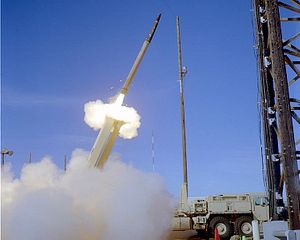The U.S. deployment of the THAAD (Terminal High Altitude Area Defense) system in South Korea has stirred enormous controversy. China is indignant over the missile defense system’s radar, which is capable of detecting missile launches from China in addition to North Korea. Within South Korea, THAAD is a polarizing issue, with most conservatives for it and liberals against it. Liberals are skeptical of THAAD’s military utility and the potential environmental hazards that it might inflict. Adding to the THAAD saga, in a report to President Moon Jae-in the South Korean Ministry of National Defense (MND) omitted the fact that four more launchers had been brought into the country in April along with the two already deployed. If the presidential office’s allegation that the MND intentionally withheld such information is correct, it is a “great shock,” as Moon has put it, and sheds light on the country’s problematic civil-military relations.
Civil-military relations, which refer to the relationship between the civilian political leadership and the military, have been widely studied due to the latent danger of a state’s military usurping control from civilian authorities. As Socrates once said, soldiers protect the state from external threats, but they themselves are also potential threats to society. For this reason, limits must be placed on the military’s role within a society, and civilian control of the military has been accepted as a norm within democratic regimes — political leaders set policy (ends), while the military use their military expertise to devise strategies (means) to implement that policy. This is essential for the democratic system, where civilian political leaders exercise the authority delegated to them by the people to rule. Thus, unelected soldiers must obey decisions made by political leaders. To this end, in most democracies civilians hold top national security posts. In the United States, active-duty military officers are prohibited from assuming key posts, and retired officers must be removed from active duty for a certain period of time — seven years in the case of secretary of defense (although an exception was made by congress for Jim Mattis earlier this year).
South Korea lacks such restrictions on the military. According to Ki-joo Kim, a South Korean researcher, among the country’s 44 defense ministers, only six (14 percent) have been civilians, i.e. people who had not served as career military officers. Since 1961, no civilian has served as defense minister. The incumbent, Han Min-koo, is a former army general who had served as the chairman of the Joint Chiefs of Staff less than three years prior to taking on his new role. Another important national security post, chief of the National Security Office, was until last month held by Kim Kwan-jin, an army general who also served as the chairman of the Joint Chiefs of Staff shortly before serving as defense minister.
Some have argued that given South Korea’s unique security circumstances, where it remains technically at war with a nuclear foe, the civilianization of top national security leadership is risky. However, the argument that leaders should be equipped with military expertise is based on ignorance of the role of civilian leadership in national security. Such ignorance is particularly problematic for a country that experienced a brutal military dictatorship from 1960 to 1988. Because the top national security positions, ostensibly charged with civilian control over the military, are in fact monopolized by military officers, there is a higher danger of the military interfering in politics and threatening civilian leadership in the future.
The recent events related to THAAD are indicative of this danger. The missile defense system was initially planned to be deployed by the end of 2017. However, the last administration rushed to complete the deployment before Moon, a critic of THAAD and the leading candidate throughout the presidential campaign, could take office. It is no secret that two former generals, Kim Kwan-jin (chief of the National Security Office) and Han Min-koo (minister of national defense), oversaw this deployment as civilian leadership was incapacitated due to the impeachment and later removal of President Park Geun-hye, Moon’s predecessor. Kim and Han presented the THAAD deployment as a fait accompli to the new president, even though THAAD has wide-ranging consequences in the areas of South Korean politics, diplomacy, and economy. This shows a clear failure of civilian control over the military.
Three decades after the end of military rule, South Korea has not yet successfully established a true democratic relationship between civilian leaders and the military. President Moon has vowed to carry out defense reform, part of which will involve solidifying civilian control over the military. Considering the power that the military holds, the battle over military reform is likely to be lengthy and difficult. However, instituting healthy civil-military relations are a critical piece needed for advancing South Korea’s democracy.
Lami Kim is a research fellow at the Belfer Center for Science and International Affairs, Harvard University, a Ph.D. Candidate at the Fletcher School of Law and Diplomacy, and a lecturer at Boston College.

































